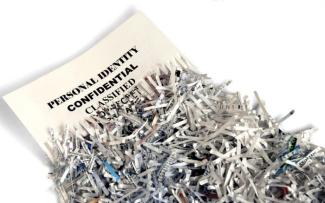
What to Shred, What to Keep
Piles of papers become a nuisance to manage and store. However, there are documents you should hang onto because you never know when you'll need them! Each type of document is different, so you want to be sure to keep the most important ones long enough before you destroy them.
On the plus side, with today's technology, documents can be stored electronically! So just how long do you have to hold on to certain documents, and when is it safe to shred them? Take a moment to review our general retention guideline so you can determine what to shred and what to keep, these tips will also help you avoid Identity Theft!
Tax information and RETURNS - Shred after 3 years
There is a general three-year statute of limitation for your taxes. This means the IRS has three years from when you file your return to start an audit. (There is no limit for fraudulent returns). Therefore, you need to keep documents that support items on your tax returns for those three years. Each year you can throw out the three-year-old documents, but you should keep copies of tax returns forever.
Investment Records & Statements - Shred after 3 years
Investment records must be kept as support for your tax returns. Documentation of purchases and sales (either confirmations or brokerage statements including the information) must be kept for three years past when you report the sale on your tax return. You may find it helpful to keep brokerage statements for many years.
Bank statements & Canceled Checks - Shred after 3 years
Some people keep every canceled check and others toss most of them. Certainly, you should keep canceled checks that support any tax deductions and any that you think may come in handy. Otherwise, canceled checks can take up a lot of space. Bank statements are a bit different. You may want to keep them for some period (three years or so) so you can document your payments for important items. Together with your checkbook register, you would be able to identify when and how much you paid for almost anything.
Paycheck Stubs - Shred after 3 months
These documents can include very important information including Social Security number and financial institution account numbers if you use direct deposit. You may need to have the last three month's stubs if you are planning to apply for a loan. Otherwise, you should only keep the latest stub.
ATM Receipts – Shred after a month or two
Keep ATM receipts until you have compared them with your bank statement. Then dispose of them carefully.
Credit Card Statements - shred after one year
Even though there is no requirement to keep these statements, you may want to save them for some period (a year) in case there is a dispute, you want to return an item or if you want to be able to analyze your spending.
Credit Card receipts- shred after a month or two
Generally, keep receipts until you have compared them to your credit card statement. However, if the receipt is for something that you may want to return, keep it longer. Also when your credit cards and debit cards become expired be sure to cut them into tiny pieces or shred them as well.
Utility Bills & Other Household Receipts- shred after a month or two
Unless you are claiming household expenses as tax deductions, there is no need to keep these types of records very long. You can always use a canceled check to document payment.
warranties- shred after expiration
Keep warranties for as long as you own the item or until the warranty period expires.
home financial information- shred after expiration
Deeds, mortgages and information on home improvements should be kept for as long as you own the home plus the three-year period for tax purposes.
personal documents / photos – shred, wipe out and physically destroy
This is your personal preference. Shred anything containing sensitive information and private pictures.
electronic files and data- shred, wipe out and physically destroy
Floppy diskettes and CDs should be shredded, destroyed or made unusable in some manner. Computer hard drives deserve special attention. Hard drives may have information on finances, taxes, user names, passwords and other information that should not fall into the hands of fraudsters. Deleting files and formatting a hard drive does not permanently remove the files from the system. Before disposing, recycling or donating a PC, the hard drive should be removed and physically destroyed.
important documents- permanently keep in a safe or fire box
Documents to keep forever include all legal documents, wills, powers of attorney, birth certificates, marriage documents, divorce or child care orders, trust documents, Current Passports, business agreements, military records, college transcripts, diplomas, home inventory, pension plans, retirement plans, social security cards, stock purchase agreements and other permanent documents.

